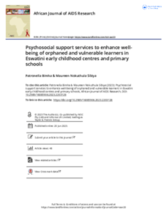In Eswatini (formerly Swaziland), the increasing number of orphans and vulnerable children due to HIV/AIDS has spurred demand for psychosocial support services. When the Ministry of Education and Training assumed responsibility for delivering psychosocial support, educators were burdened with the additional role of looking after orphans and vulnerable learners.
This exploratory, sequential, mixed-methods study was employed to analyse factors that enhance the provision of psychosocial support services and the perceptions of educators towards psychosocial support delivery. The qualitative study phase entailed 16 in-depth interviews with multi-sectoral psychosocial support specialists and seven focus group discussions with orphans and vulnerable learners. In the quantitative study phase, 296 educators were surveyed. Thematic analysis was used for the qualitative data, and the quantitative data was analysed using Statistical Package for the Social Sciences version 25 software.
The findings reveal problems associated with psychosocial support service delivery at strategy, policy and operational levels. The results indicate that orphans and vulnerable children are offered material support (e.g. food and sanitary pads) and spiritual support, but were rarely referred for social and psychological needs. There were no proper counselling facilities and not all teachers received relevant training in children’s psychosocial needs. Training of educators in specific psychosocial support areas was considered significant to enhance service delivery and the psychosocial well-being of the learners.
Overall, accountability was difficult to establish because the administration of psychosocial support is split among the Ministry of Education and Training, the Deputy Prime Minister’s office and Tinkhundla administration. There is unequal distribution of qualified early childhood development teachers to cater for early childhood educational needs.

